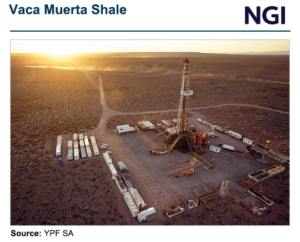International | LNG | LNG Insight | NGI All News Access
LNG 101: How Russia Expects to Receive Rubles for European Natural Gas Deliveries
© 2024 Natural Gas Intelligence. All rights reserved.
ISSN © 1532-1231 | ISSN © 2577-9877 |

LNG
Argentina’s vast natural gas resources would only be fully developed with an LNG export facility, according to experts who spoke at a recent energy conference. “Clearly we think we need to develop the regional market,” said Pampa Energía’s director of commercialization and midstream, Santiago Patrón. The executive at one of Argentina’s top natural gas producers…
April 23, 2024Infrastructure
By submitting my information, I agree to the Privacy Policy, Terms of Service and to receive offers and promotions from NGI.